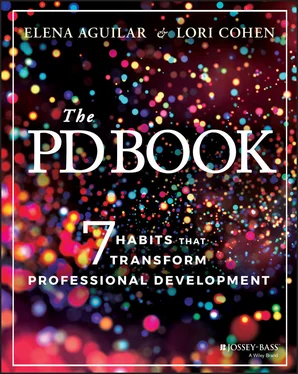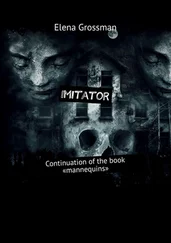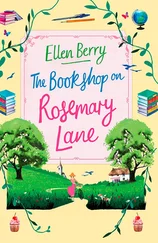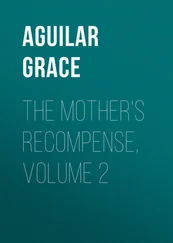Elena Aguilar - The PD Book
Здесь есть возможность читать онлайн «Elena Aguilar - The PD Book» — ознакомительный отрывок электронной книги совершенно бесплатно, а после прочтения отрывка купить полную версию. В некоторых случаях можно слушать аудио, скачать через торрент в формате fb2 и присутствует краткое содержание. Жанр: unrecognised, на английском языке. Описание произведения, (предисловие) а так же отзывы посетителей доступны на портале библиотеки ЛибКат.
- Название:The PD Book
- Автор:
- Жанр:
- Год:неизвестен
- ISBN:нет данных
- Рейтинг книги:5 / 5. Голосов: 1
-
Избранное:Добавить в избранное
- Отзывы:
-
Ваша оценка:
- 100
- 1
- 2
- 3
- 4
- 5
The PD Book: краткое содержание, описание и аннотация
Предлагаем к чтению аннотацию, описание, краткое содержание или предисловие (зависит от того, что написал сам автор книги «The PD Book»). Если вы не нашли необходимую информацию о книге — напишите в комментариях, мы постараемся отыскать её.
The PD Book,
The PD Book
The PD Book — читать онлайн ознакомительный отрывок
Ниже представлен текст книги, разбитый по страницам. Система сохранения места последней прочитанной страницы, позволяет с удобством читать онлайн бесплатно книгу «The PD Book», без необходимости каждый раз заново искать на чём Вы остановились. Поставьте закладку, и сможете в любой момент перейти на страницу, на которой закончили чтение.
Интервал:
Закладка:
Finally, I must acknowledge the nonhuman creatures who bring me tremendous joy every day. These include the hummingbirds who drink at the feeder outside of my office window, and my cats—Mango, Serena, and Clementine.
I am in awe of the love I receive from so many beings. To all of you: thank you.
From Lori
First and foremost, I'd like to acknowledge Elena Aguilar for bringing me on this life‐changing journey. If someone told me several years ago that I would work with Elena Aguilar and eventually coauthor a book with her, I would have fallen out of my seat and told them to get out of town. A series of joyful “talk about our work” conversations soon morphed into a project and then into a book. Throughout the writing process, our collaboration nudged and nourished me. Elena's mentorship, guidance, partnership, and encouragement have transformed the way I coach, teach, write, and lead PD. I have grown exponentially and am fundamentally changed through working with Elena. My gratitude is as vast as the Pacific Ocean.
Caitlin Schwarzman, our editor, has been a gem and a necessity throughout the drafting stages. Her careful editing and reassurance allowed me to produce stronger and stronger work with each chapter draft. Caitlin's influence is on every page.
I am a firm believer that we never do anything alone, and this book was largely produced in community. I thank the lineage of mentors who created the conditions for me to lead adult learning: Jane Haladay, who inspired me to be a teacher; with wisdom, wit, and love, Jane taught me to be the best version of myself in classrooms—and in life. Kathy Dixon and Area 3 Writing Project Consultants at UC Davis taught me that “teachers teaching teachers” honors the dignity and expertise of adults; I cut my workshop teeth in those A3WP summer institutes. Janet McGarvey saw my leadership potential, sponsored me, and provided me a platform to lead workshops for California independent school educators. Lise Shelton fostered my ongoing growth and commitment to equity, designing optimal pathways that allowed me to coach and lead adults at our school.
There are not enough exclamation points to communicate my gratitude for my former and current Bright Morning teammates. My former teammates: Noelle Apostol Colin, Janet Baird, and Jessie Cordova buoyed me with intentionality, brilliance, and humor as I learned how to facilitate Bright Morning workshops. Helen Park Truong's reassuring words affirmed me; her incisive equity lens ensured everything I produced would best meet the needs of all workshop participants.
My current teammates: LesLee Bickford sparks my imagination and ignites my spirit; I credit her for green‐lighting the approach to the Artful Design and Facilitation workshop, a series that inspired this book and brought me infinite joy. My teammate Rebecca “eagle eye” Blackmer is a careful reviewer, a heart‐centered leader, a brilliant human, and a dear friend. I can't imagine this stage of my professional and personal journey without her. And my teammate Debbie Daly—the paragon of compassion—offers love and support that gives me solace.
I am grateful for the extended wolfpack who supported me throughout the drafting process—LesLee Bickford, Rebecca Blackmer, Elizabeth Denevi, Shoba Farrell, Juna Kim McDaid, Helen Park Truong, Lise Shelton, and Tamisha Williams—for having conversations that sparked my thinking, sharing provocative ideas and asking probing questions, reading chapter snippets and drafts, sending “car polos” and text threads and Bitmojis and notecards that said the exact right thing at the exact right moment, and being an inspiring crew of co‐facilitators, co‐conspirators, and co‐creators of the world I want to inhabit.
I am also grateful for every co‐facilitator, co‐designer, and collaborative partner with whom I've worked. There are too many to name. I hope the pages in this book are reflective of what I learned with and from you.
Finally, I want to thank the loves of my life, Amy and Buster. Buster (whose age perplexes me) is my ride‐or‐die canine companion. Whether he's alive or not by the time this book is published, he's always going to be the adorable little creature who snores through all the PDs I lead. He teaches me acceptance and keeps me humble. Amy is my partner, my best friend, my favorite person, and my best cheerleader. She believes in a version of me that I strive to become daily. I cannot imagine writing this book without her support.
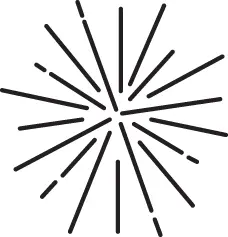
INTRODUCTION
On the final morning of a three‐day retreat that Elena facilitated, she held time for questions. A participant raised her hand hesitantly. “It's okay if you don't want to answer this,” she said. “Because maybe you can't reveal your secrets or maybe it's magic or something, but how did you know to put us with the others in our home groups? I love these people so much,” she motioned to the three people at her table, “and I can't imagine a better grouping!”
Chatter filled the room as people said things like, “Me too! I love my group.” Someone else said, “And I also love everyone else I've met in these days outside of my home group!” There was more chatter as participants concurred.
Elena smiled and observed the 60 educators who had convened for this residential professional development institute on emotional resilience in educators. They had traveled from across the United States to a retreat center in the mountains above Santa Cruz, California, for three nights and three‐and‐a‐half days. A few participants came from the same organization, but most were strangers when they'd arrived. Knowing this, Elena had grouped them into “home groups” of four or five people.
On the first evening, after dinner, Elena asked them to spend two hours telling stories in home groups. They could sit around one of the outside fire pits or in the massive infinity hot tub that overlooked the redwoods, and they had a protocol to follow and storytelling prompts. That evening, Elena wandered around and observed these educators, who had met only six hours before, tell stories about heartbreak and life‐changing decisions, about fears and hopes and dreams. She observed them listening to each other, affirming each other, and building community.
Throughout the retreat, home groups sat together for sessions, had delicious meals together and went on walks in the forest, and processed and practiced all the content. They also interacted with other participants in the retreat, but they spent a lot of time in their home groups.
The design of the retreat was complex, but the answer to the question “How did you know to put us together?” was simple.
“The truth is,” Elena said, “your groupings were totally random. Sometimes I'm super intentional about creating groups—usually when I'm meeting with folks for multiple sessions, but in this case, I knew very little about you.” Elena remembers feeling a little embarrassed revealing this—she had wanted to say, oh, it was all so intentional! Every single thing! But that wasn't the truth, and it wasn't what made the retreat so powerful.
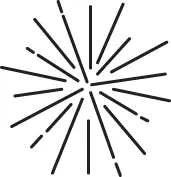
We, the authors of this book, work for Bright Morning, an organization founded by Elena Aguilar, which brings transformative learning experiences to educators working to create equitable schools. In our workshops, we teach people the art of connecting to themselves, to each other, and to those in their communities. Sometimes the learners in our sessions are amazed by what we orchestrate and experience the facilitator as having access to magic. Obviously, we're not wizards, and because we aspire to teach others the strategies we use, we pull on the thick ropes of the stage curtains to reveal how we create powerful PD.
Читать дальшеИнтервал:
Закладка:
Похожие книги на «The PD Book»
Представляем Вашему вниманию похожие книги на «The PD Book» списком для выбора. Мы отобрали схожую по названию и смыслу литературу в надежде предоставить читателям больше вариантов отыскать новые, интересные, ещё непрочитанные произведения.
Обсуждение, отзывы о книге «The PD Book» и просто собственные мнения читателей. Оставьте ваши комментарии, напишите, что Вы думаете о произведении, его смысле или главных героях. Укажите что конкретно понравилось, а что нет, и почему Вы так считаете.
